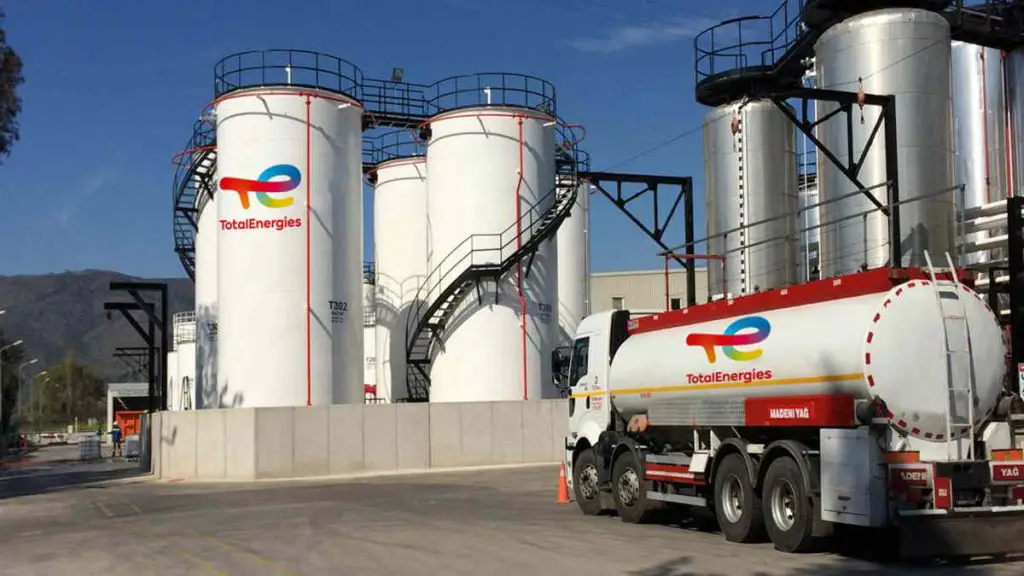- It has been confirmed by TotalEnergies that it will be selling its interest in 13 onshore fields and three fields located in the shallow sea
- TotalEnergies launches sale of a stake in Nigerian oil joint venture, SPDC; other partners are Shell 30 per cent, NNPC 55 per cent, and Eni 5 per cent.
- The scourge of oil theft, which has reached enormous and potentially dangerous proportions, is lamented by industry professionals as a major deterrent to venturing into the oil and gas sector
- It is estimated that the country lost approximately $3.5 billion in revenue due to the theft of crude oil in 2021, which corresponds to almost 10 per cent of Nigeria’s foreign reserves
TotalEnergies has initiated the sale of its 10 per cent shares in Nigerian joint project SPDC.
According to a Reuters report, Canada’s Scotiabank is managing the sale as a financial adviser, a sale document bidding for interest revealed. The French oil company announced the sale in late April.
It has been confirmed by TotalEnergies that it will be selling its interest in 13 onshore fields and three fields located in the shallow sea. Together, these fields produce more than 20,000 barrels of crude oil equivalent per day. The infrastructure, including 3,500 kilometres of pipelines connected to two important oil export terminals (Bonny and Forcados), is included in the deal.
The French firm will maintain ownership of oil mining licenses 23 and 28, as well as its investment in the accompanying gas pipeline grid that supplies Nigeria LNG with fuel.
Because of years of sabotage and theft that have deteriorated resources along the oil-rich delta region, large oil corporations have been gradually abandoning Nigeria’s onshore production. This is owing to the fact that Nigeria’s onshore production is located in a hostile environment.
SPDC is a partnership in which Shell (SHEL.L) has a working interest equal to thirty per cent, NNPC (NNPC.L) has a working interest equal to fifty-five per cent, and Eni (ENI.MI) has five per cent. Additionally, Shell is selling its investment in SPDC. However, these attempts have been stalled due to a legal dispute.
Why are oil majors fleeing Nigeria?
In March of this year, the Nigerian National Petroleum Company, often known as NNPC Limited, provided confirmation that international oil companies (IOCs) are expanding their operations and leaving Nigeria.
Mele Kyari, Managing Director of the Nigerian National Petroleum Corporation (NNPC), made this announcement in Abuja at the Nigeria International Energy Summit 2022 (NIES2022).
According to him, the reason international oil companies left Nigeria was not because of the country’s poor policies but rather of the worldwide initiative for energy shift and the goal of reaching net-zero carbon emissions.
His exact comments were, “Companies are selling off their assets. They are literally abandoning our country, which is probably the most accurate way to express it. However, despite the lack of opportunities, they have no intention of leaving.
“This is happening because businesses are refocusing their portfolios on areas in which they can add value and, in addition to that, areas in which they can also contribute to the movement toward producing no net carbon dioxide.” We have a complete and utter understanding of this.
To put it another way, these “oil giants” are abandoning Nigeria in droves because, in comparison to other surroundings, the country is no longer sufficiently hospitable for them or the “new companies” they might expand into (including transactions involving clean and renewable energy sources). This new trend is, to say the least, ominous for Nigeria, whose economy will continue to rely significantly, at least in the short-to middle-term, on earnings from the production and export of crude oil.
Regrettably, this departure of IOCs is occurring across the industry as a whole, including deep waters, mid-sea, and shallow waters players. According to the Nigerian Extractive Industries Transparency Initiative (NEITI), the ombudsman of the extractive industry, the persistent problems of vandalism and oil theft were some of the causes responsible for the continuous divestment by IOCs and large corporations in the shallow sea sector. At the NIES2022 conference in Abuja, the Executive Secretary of NEITI, Dr Ogbonnaya Orji, lamented the fact that Nigeria had lost 260.15 million barrels of crude due to theft in the previous five years.
“This is a huge problem that is currently affecting our shallow and mid-sea operations very negatively and seriously,” he said, adding that many IOCs and large corporations are gradually exiting the shallow sea sector due to the difficulties in dealing with vandalism, oil theft, and deliberate sabotage.
The scourge of oil theft, which has reached enormous and potentially dangerous proportions, is lamented by industry professionals as a major deterrent to venturing into the oil and gas sector.
It is estimated that the country lost approximately $3.5 billion in revenue due to the theft of crude oil in 2021, which corresponds to almost 10 per cent of Nigeria’s foreign reserves.
Muda Yusuf, CEO of the Centre for the Promotion of Private Enterprise, stated that due to the unstable operating environment, many oil companies have been forced to divest their producing assets and have left Nigeria, while others have chosen to conduct offshore exploration.
Yusuf stated that the oil industry has regularly contributed less than ten per cent to Nigeria’s Gross Domestic Product (GDP). He also stated that, as of the third quarter of the previous year, 2021, the oil industry was one of the few that decreased.
The operators of the industry are of the opinion that the primary factor contributing to oil theft in Nigeria is obsolete oil pipeline infrastructure, which makes it simple for third parties to commit breaches.
Furthermore, there is a lack of investment across the sector, which, along with the poor security of the country’s waterways, demonstrates that not much is being done to combat crime. In some instances, security agencies collude with cartels in order to get paid, which is a clear indication that not much is being done. (idealhealth123.com)
Read: Tanzania, Uganda crude oil deal soars as new MoU is signed











